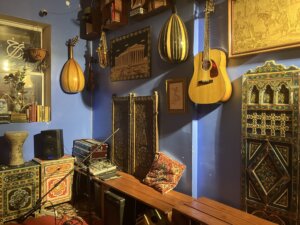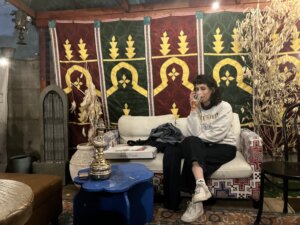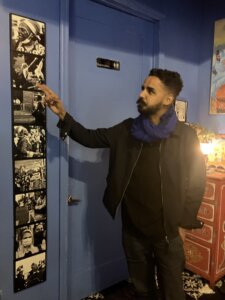Barazakh’s blue theme is an homage to nomads of the Sahara who traditionally wore blue to stay cool in a hot climate. Photo by Lauren Hakimi
It’s 9:30 on a Tuesday night and 20 young people are gathered around in this homey Brooklyn café, sitting in folding chairs on a collage of Middle Eastern rugs, ready for an encore.
“Toda raba, habibi,” says El Atigh Abba, the owner of the café, thanking the musicians after they finished leading yet another Ladino song.
Abba, 36, has the cool uncle energy necessary to run this kind of café, where people do everything except work. The mustachioed and eternally smiling Mauritanian dissident greets his guests in no fewer than six languages, including Hebrew.
On its busy calendar of speed dating events, belly dancing performances and fundraisers for Palestinians, Crown Heights’s Barzakh Café — named for the Muslim concept of an in-between place — has also hosted Jewish events, including interfaith Shabbat dinners, a conversation with an Israeli peace activist and celebrations of the Maghrebi Jewish holiday Mimouna.
Barzakh is no more Jewish than it is Syrian, African or Cuban, yet it offers many young Jews something they feel is hard to find elsewhere. For liberal Jews from Mizrahi communities, which tend to be conservative and staunchly pro-Israel, Barzakh presents a rare combination: Mizrahi traditions and pro-Palestinian values.
It’s not quite as “kumbaya” as it may sound. Some of the café’s patrons oppose ‘normalizing’ Israeli peace activists, and hosting a Hebrew-Arabic language exchange, given modern Hebrew’s connection to Zionism. But Abba has held fast against critics and continued to offer a varied flow of Jewish events — and he peppers his speech with modern Hebrew.

Café Tunis in Brooklyn
The Arab activist is a living exemplar of “both, and” — in his case, criticizing “both” Muslim extremists “and” Jewish ones. While studying geology in college in Morocco during the Arab Spring, he started an anonymous Facebook page that allowed him to share content critical of North African governments, which was initially posted on platforms that are banned in those countries. He called his blog “The Arab Critic.” “It was pushing the boundaries, calling for religious reform in Islam, calling for the possibility of pluralism,” Abba said as I spoke with him in the back room of his café.
After finishing his bachelor’s degree, Abba returned to his native Mauritania, where he spent time in the capital city of Nouakchott in a cafe called Café Tunis. There, people gathered to discuss politics, even though they knew there were informants there, too. A rumor spread — not entirely untrue — that the people who hung out there were heretics. “Couple times, we got attacked physically in Café Tunis,” Abba said. He said he also received threatening text messages. “The police said, ‘you’re on your own.’”
Abba came to the U.S. after he was invited to attend a program at the University of Georgia for international journalists. One day, he was in Georgia scrolling through his Facebook news feed when he learned that a local imam had issued a fatwa — an Islamic legal ruling — calling on ordinary citizens to kill Abba, alleging that he was a blasphemous infidel. In other words, Abba said, mimicking the imam, “If you cross paths with him in the supermarket, I give you the green light to stab him, and you have the best five-star suite in heaven.”

A welcoming place
We had moved to the backyard, and as he spoke between bites of zaatar bread and fava bean soup, the smell of hookah filled the air. Elsewhere in the backyard, people were discussing Palestinian protests and New York Governor Kathy Hochul’s mask ban — all of it contingent on the lucky fact that Abba has never, to this day, entered the wrong supermarket at the wrong time.
After finishing his program in Georgia, Abba moved to Brooklyn. He washed dishes in a Palestinian restaurant, opened a few bodegas and taught French classes in Sunset Park. He moved from Bay Ridge to Crown Heights so that he’d be forced to learn English more quickly. Meanwhile, he and his growing cadre of Arab and Middle Eastern friends toured Brooklyn’s bar scene in search of a space that could accommodate them. What Abba really wanted was to find somewhere like the Café Tunis of his native country. After the pandemic arrived, bringing with it decreased commercial rents, Abba saw his chance.
“We were aiming for Manhattan, but it’s just not affordable,” Abba said. “When you have a library and a garden, you don’t need anything else. None of the neighborhoods could provide that except this side of Crown Heights.”
After signing a lease in 2022 for the space on Utica Avenue, he chose to paint the facade light blue and have a blue theme throughout the café, an homage to nomads of the Sahara who traditionally wore blue to stay cool in a hot climate. It also just looks pretty.
Inside Barzakh, musical instruments from various cultures hang from the walls alongside paintings and posters advertising future events. On a wall separating the bar from the back room hangs some of Abba’s own art: a floor-to-ceiling grid of black-and-white photos he took of people in Crown Heights. This includes photos from a Black Lives Matter protest and a photo of the Israeli owner of Salon on Kingston who let Abba use the space for free before Barzakh was founded.

“You can see that every little detail that went in is from his heart,” said Sara Erenthal, an artist and activist who has attended Jewish events at Barzakh.
Hadar Cohen, a self-described Arab Jewish artist who has cohosted interfaith Shabbat dinners at Barzakh, said she hasn’t been to many Jewish spaces because she fears people there might comment in favor of Israel’s actions in Gaza — and because “most Jewish communities are so Ashkenormative.” She likes going to Barzakh though, partly because the Jewish events it hosts tend to emphasize Sephardic and Mizrahi traditions. “I don’t know a lot of synagogues that host Mimounas,” she said.
‘People have to sit in a room and talk’
Shira Seri Levi, an artist with Yemeni Jewish and Ashkenazi heritage, said she goes to Barzakh often to practice her Arabic, and because she feels welcome there as an Israeli.
“Just existing as an Israeli right now can be a very political thing. You never know if someone will get triggered, how people will react, and you want to get judged by your personality,” Seri Levi said. “It can be really lonely when you feel like everything about who you are is just about the war.”
Recently, Seri Levi and her husband Michael Nadav co-hosted, with Abba, a Hebrew-Arabic language exchange at Barzakh. An Instagram post advertising the event caused a stir among some of Barzakh’s anti-Zionist audience.
“I think Judeo-Arabic and Judeo-Persian would be totally fine but Hebrew was not a spoken language until Zionists literally sat down and made up modern words to turn it into their colonial language,” one user commented, to the tune of 56 likes. Some commenters called on Barzakh to cancel the event.
Abba said the negative comments made him double down on holding the language exchange. “There is within the Arab young generation, the kids who were born here in U.S.,” he said, “an idea that you cannot sit with an Israeli in the same room,” or that Jews have to pass a political litmus test before being welcomed. “I’m the owner of this place and I say this is not the case.”
“Sitting with an Israeli doesn’t mean we’re going to be cowards or traitors,” he said. “If you have beef with somebody you have to know who’s who, what’s his strength, what’s his weakness. Maybe there’s a misunderstanding. Maybe there’s a way out. I genuinely believe the only way to break the cycle of violence is to sit at the same table and address it.”
“It’s a simple statement: People have to sit in a room and talk. But you do lose business.”
And if he does? “I’ve started from scratch and I can start from scratch again,” he said.
